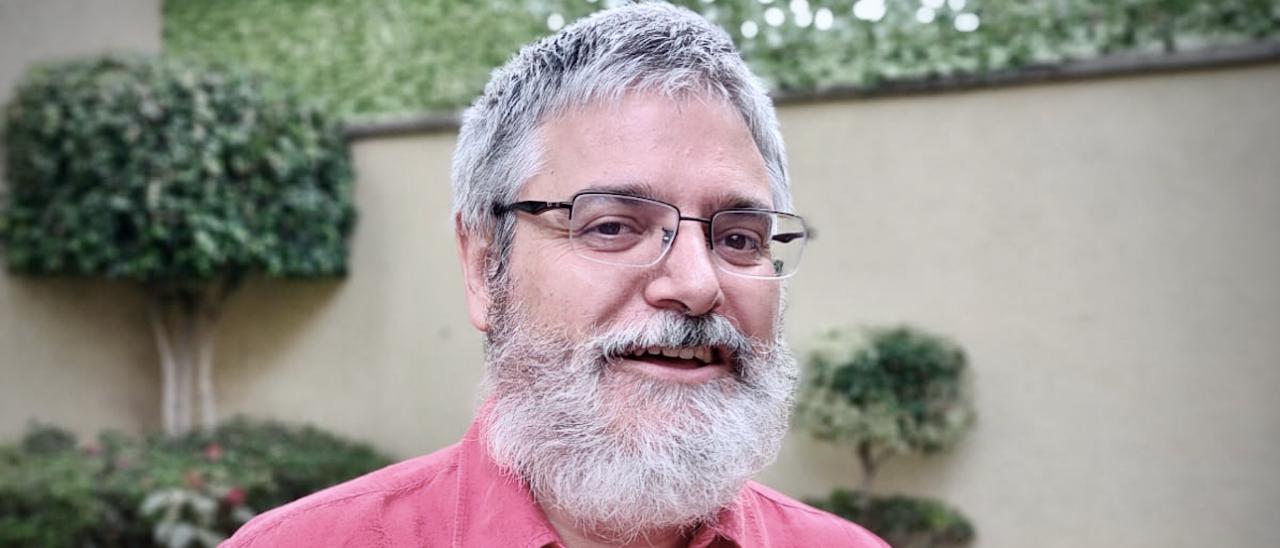Dr. Sebastián Sánchez, born in Badajoz (Spain), naturalised Mexican, studied a degree in Physics from the University of Salamanca (1995) and PhD in Astrophysics from the University of Cantabria (2001), both in Spain. He has worked at the observatories of La Palma (2001) and Calar Alto (2004-2010, where he was resident astronomer and coordinator of the astronomy group), with postdoctoral stays at the Astrophysical Institute Potsdam (2002-2004, Germany), Centro de Estudios de Física del Cosmos de Aragón (2010-2011) and Instituto de Astrofísica de Andalucía (2011-2012). Since 2013 he has been a Senior Researcher at the Institute of Astronomy of the UNAM, currently holding the rank of Permanent Senior Researcher C, and level 3 of the Mexican National System of Researchers.
Dr. Sánchez's scientific research has focused on understanding the evolution of galaxies through the study of their specially resolved spectroscopic properties, pioneering the implementation of integral field spectroscopy techniques in the study of galaxies. Within this field he conceptualised techniques for the reduction of this type of data, providing the community with computational methods to reduce, visualise and analyse stellar populations and ionised gas.
Dr. Sánchez has been the principal investigator of the first massive integral field spectroscopy survey of galaxies in the Local Universe (CALIFA, http://califa.caha.es). CALIFA brought together more than 80 scientists from more than 20 different countries, resulting in more than a hundred publications in peer-reviewed journals, more than 50 conference presentations, and training 24 PhD and MSc students. The results of the projects he has developed, and specifically CALIFA, have changed the paradigm from which galaxy evolution is studied, focusing now on the understanding of processes and relationships at local scales, from which global relationships emanate, laying the foundations for new similar surveys with a larger number of galaxies, such as MaNGA, SAMI or AMUSING, of which Dr. Sánchez is a promoter and founding member.
Discoverer of local-scale relationships between star formation rate and surface mass density, and oxygen abundance in galaxies, which have shown that new star formation and chemical enrichment is governed by laws that hold on kiloparsec scales. The relevance of this research has been recognised worldwide, and he is regularly invited to participate in review panels, scientific committees organising conferences, and to present seminars or invited talks at conferences. All this has led the prestigious journal Annual Reviews of Astronomy & Astrophysics (the journal with the highest impact in the field) to commission him to write a review article that was published this year 2020, being the only IA-UNAM astronomer who has led such an article as first and only author.
Dr. Sánchez has participated in more than 500 publications, 300 of them in international peer-reviewed journals, and about 200 corresponding to conference proceedings. These publications have more than 25,000 citations, more than 3,000 corresponding to the 64 publications of which he is first author. He is therefore the most cited astronomer at IA-UNAM and the second most cited physicist in Mexico. During his career he has supervised seven PhD theses, and as many Master's theses, with two more PhD theses in progress at the moment, in addition to having been in charge of the supervision of fourteen postdocs. He has participated in more than a dozen research projects, both national and international, both in basic science and linked to instrumental development and the creation of new computational techniques focused on data reduction and analysis.
He worked within the team that developed the PPAK instrument (AIP, PI: M. Roth), led the creation of the echelle spectrograph CAFE (CAHA), and the SPICA, ESCALIBUR, SAOLIM instruments. He was responsible for instrumental development at Calar Alto observatory, and was in charge of the characterisation experiments at Calar Alto and Javalambre observatories. He is currently the Head of Observational Astronomy at IA-UNAM, from where he drives the LVM project of the SDSS-V collaboration (being the representative of UNAM in this project).
He completed his undergraduate studies thanks to a grant from the Spanish Royal Society of Physics as one of the winners of the Physics Olympiad of his year, and his PhD with an FPI grant for his own academic merits. He was also twice awarded the prestigious Ramón y Cajal grant (MICINN, Spain), being the only researcher to be awarded twice, and a Marie Curie postdoctoral fellowship (European Research Council). He has been a member of the Spanish Society of Astronomy, and at this moment of the Mexican Society of Physics (Sec. Astronomy), and of the International Astronomical Union (IAU). He is also a member of the panels of evaluators of the EVALUA system (formerly ANEP, Spain), PAPIIT, Conycit (Chile) and the European Research Council (ERC).

